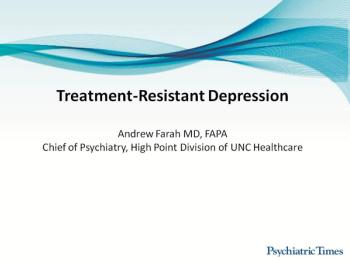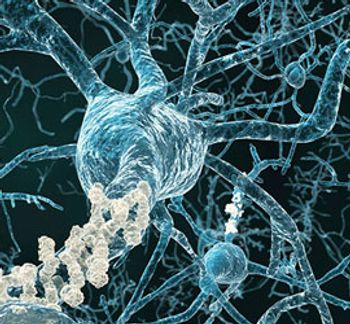
There has been a lot of publicity about hearing loss as a predisposing factor to depression and dementia. What about visual problems? These questions and more in this expert Q&A.

There has been a lot of publicity about hearing loss as a predisposing factor to depression and dementia. What about visual problems? These questions and more in this expert Q&A.

In this podcast, B. Andrew Farah, MD, looks at shortcomings of current therapy that make treatment-resistant depression so common, offers insights into the genetic underpinnings of TRD, and focuses on a new treatment paradigm.

What happens when our patients get pregnant or plan to get pregnant? What if psychiatric illness manifests during pregnancy or the perinatal period? Dr Elizabeth Fitelson answers these questions and more in this video.

Vitamin D has been hailed as the “sunshine” vitamin with many therapeutic attributes. The authors explore the association between vitamin D deficiency and increased risk of depression.

When Wordsworth rhapsodized about yellow flowers, it is doubtful that he expected his verse to translate into the mental health realm. Yet that is exactly what happened.

What medications are FDA approved for alcohol dependence? Take the quiz and learn more.

What's new in sleep medicine? The latest developments in both new and novel approaches to treating sleep disorders.

It is time for psychiatry’s critics to drop the conspiratorial narrative of the “chemical imbalance” and acknowledge psychiatry’s efforts at integrating biological and psychosocial insights.

A reexamination of flurothyl infusions holds promise for improved resolution of severe mood disorders, as well as for a greater understanding of the mechanism of their pathophysiology.

Because half of pregnancies in this country are unplanned, it's crucial to counsel women of reproductive potential about their medications-regardless of their plans to conceive.

With the multitude of nutritional products available to patients via the Internet and health-food stores, psychiatrists need to be prepared to respond to questions from patients about the value of these supplements.

Starting in 2015, psychiatrists will have to juggle antidepressant selections for Medicare patients. What might this mean for your patients?

Here's the story of a man with long-standing diabetes -- a pillar of the community-- who had been behaving strangely. He taught his physicians to look past the obvious clues and ultimately learn a lesson they never forgot.

In order to make positive changes in the field of psychiatry, it is important to appreciate and understand the current challenges and significant limitations of the present approach to psychiatric therapy.

There is very little evidence for the efficacy of antidepressants in bipolar disorder, particularly for longer-term use. However, there are at least 9 alternatives to conventional antidepressants.

Narcolepsy, cataplexy: symptoms are broad and associated with a range of medical and psychiatric comorbidities. Here: diagnostic and treatment strategies and a look at the BOND study.

There is renewed interest and enthusiasm for the potential pathophysiological role of inflammation and immune dysfunction in patients with schizophrenia, with evidence for abnormalities in the blood, CSF, and CNS.

Alzheimer disease psychosis appears to be a distinct clinical entity. This article focuses on management strategies.

What do we know about the relative efficacy of current medication and therapy for OCD? This question answered and highlights of recent studies, future directions, and causes are summarized in this video.

This case study of a 21-year-old woman-referred by a relative because of long-standing severe interpersonal, academic, and occupational impairment-illustrates the importance of screening patients with brief episodes of depression for mixed features.

A recent systematic review and meta-analysis that compared benzodiazepines with antidepressants for anxiety disorders has triggered a debate among clinicians about first-line treatments, efficacy for specific disorders, and adverse effects.

An expert summarizes the effectiveness of the treatments for obsessive-compulsive disorder, including pharmacotherapy and a very specific type of cognitive behavioral therapy.

Johnson & Johnson and its subsidiaries will pay more than $2.2 billion to resolve criminal and civil liability arising from allegations relating to the prescription drugs Risperdal, Invega and Natrecor, including promotion for uses not approved as safe and effective by FDA and payment of kickbacks to physicians and to the nation’s largest long-term care pharmacy provider.

Mood switching is not uncommon and it is much more prevalent in depressed juveniles than in depressed adults, and there is a large apparent excess of antidepressant-associated switching over reported spontaneous diagnostic changes to bipolar disorder. Details here.

The challenges of identifying patients at risk for alcohol withdrawal have been found to be mitigated by the development of a Risk Stratification Questionnaire, now being adopted by the VA regionally throughout New England. More in this video.